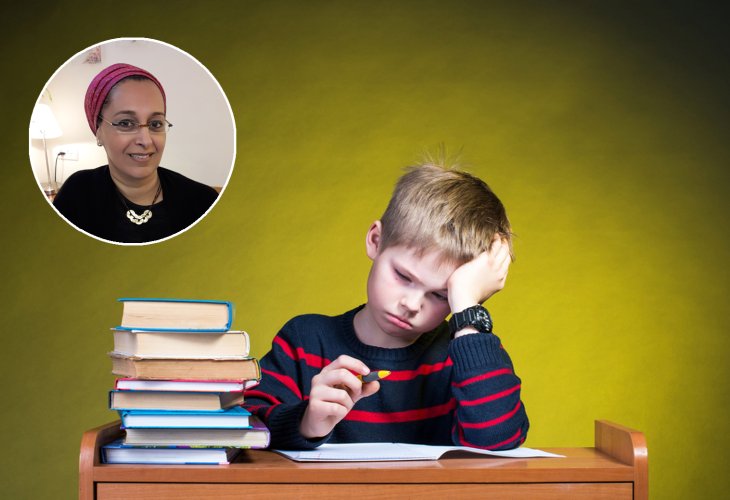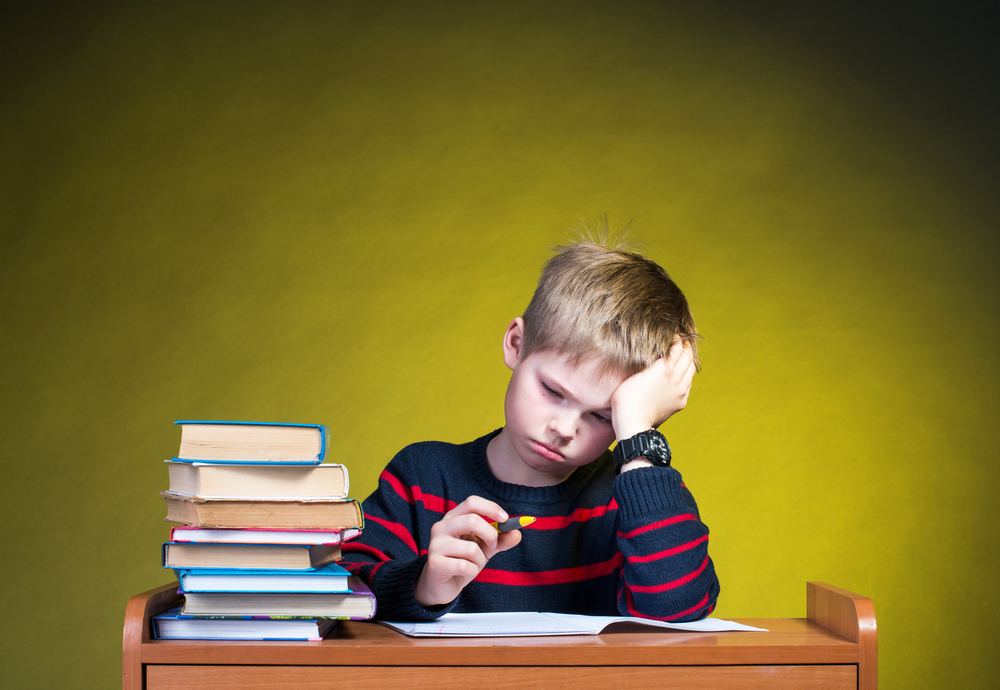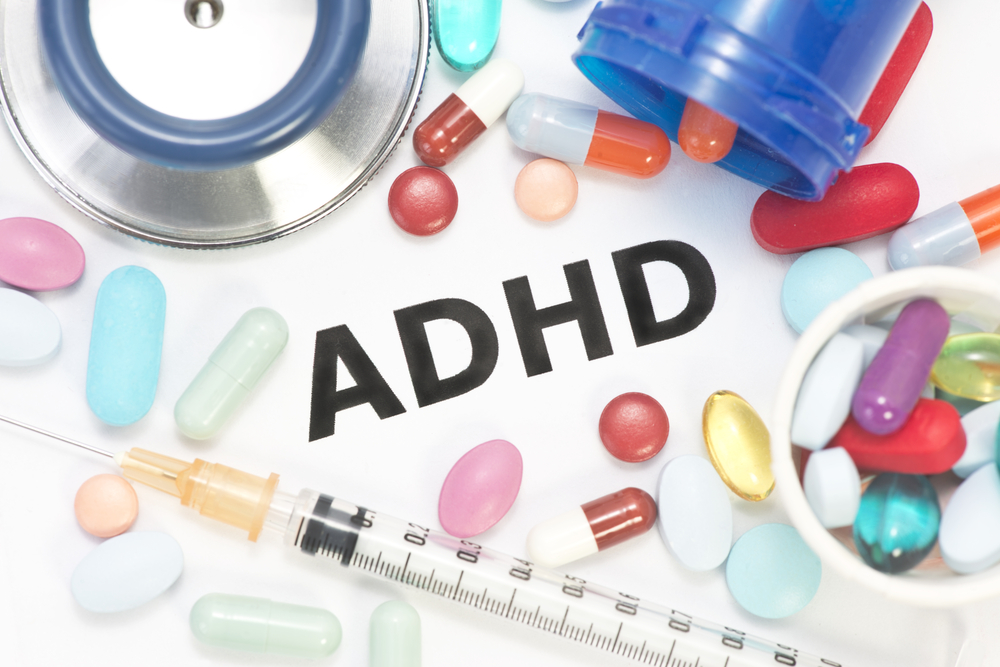Understanding ADHD Treatment: Exploring Alternatives to Medication
"Working with children who face ADHD is intense, but ultimately rewarding. We discover just how loved and enlightened our children are, and alongside that, we also learn about ourselves and our partners." A conversation with clinical psychologist, Meirav Beker.
 "Intensifies the feeling of loneliness" (Illustration: shutterstock)
"Intensifies the feeling of loneliness" (Illustration: shutterstock)Clinical psychologist Meirav Beker addresses a hot-button issue in therapeutic and educational discussions—should a child with ADHD receive medication? In many ways, her stance is anti-establishment. Based on her personal and professional experience, she opposes medicating children, at least as a blanket solution: "Ritalin intensifies a child’s experience of loneliness. Yes, it allows for quiet thoughts and creates focus. But since thoughts and emotions are intertwined, it means that if I don't fix what needs fixing and just mute the symptoms, the emotional experience is also damaged."
Beker, 51, is a clinical psychologist living in the rural community of Beit Gamliel. She is a mother of five and married to Avshalom, a professional industrial and management engineer. She holds both a bachelor's and a master's degree and currently works as a psychologist at a school for at-risk youth. Additionally, she runs a private clinic, treating adolescents, offering parental guidance, couples therapy, and advising educational staff.
"I turned to a religious path after I was discharged from the army," she shares. "My grandfather of blessed memory, Shmuel Zahavi-Halevi, influenced me. Observing his faith-based approach taught me about the powers embedded in Judaism and Torah study. He didn’t need to say anything to create change. Just watching him was enough. Until then, I wasn’t far from religion, having grown up in a traditional home that became more observant, but I remained secular. I had objections to Judaism, but after the army, when I began considering what kind of home I wanted to build, I decided to make a change and returned to the faith. Something about a Jewish home’s atmosphere was very appealing and drew me in."
Subsequently, facing personal challenges with emotional issues, and ADHD herself, she realized a change in perspective was necessary as both a mother and a therapist. "In a sense, it’s easiest for us parents to project the problem onto the children and say—they are the ones who need to change. However, when truly addressing the issue, we understand that the need for change begins with us."
Over the years, Beker has treated numerous children suffering from ADHD. "Usually, children report feelings of loneliness, a drop in mood, and even depression. I find it difficult. You are stifling the child from a young age, telling them that what they feel is wrong. The reality they are in is not right—even though the children are correct. When a child feels restless, uncalm, there’s a reason. It might be due to a lack of trust in themselves or the adults. They know what they’re saying, but we find it hard to see. We want the children to undergo changes while we are unable to make even the slightest alteration."
 (illustration: shutterstock)
(illustration: shutterstock)How damaging can criticism be?
"I came across a case of a girl who didn’t want to study. She was diagnosed with ADHD, and psychosomatic issues began to emerge. Honestly examining herself, the mother discovered she didn’t love her daughter enough. She was judgmental and critical of her and found it easier to be tougher with her because she was a strong and opinionated child. Exploring with the girl revealed she was jealous of her brother’s success and the parents’ praise towards him, contrasted with the criticism she felt from her parents, which was sometimes covert."
Admitting you may not be a good enough parent is hard for any parent. It requires a lot of honesty to say it. Unfortunately, many adults fall into anxiety and helplessness when they witness children losing their way. We therapists also have a duty not to panic in front of bewildered and restless children. They need to feel, on the one hand, that we believe in the good and the strengths present within them, and on the other hand, that we see the difficulties, are not frightened, and can instill them with confidence and hope for change."
Judaism Has a Mandate for Healing
According to Beker, Judaism actually serves as a lever for healing: "Judaism has a mandate to offer unlimited healing, as there is only one healing force: the Creator. According to psychology, based on Western culture, healing depends on the individual, and as we know, the person is a limited being. In Judaism, healing depends on the degree of a person's trust in the healing power of the Creator, not in what statistics or science say. These nuances are significant in the process of healing."
"Furthermore, Judaism does not compare the individual to someone else. Each person stands on their own, and their progress is relative to themselves. Everyone is required to mend their ways, and there is always something to correct and places to advance and move. While psychology diagnoses others relative to a norm set according to studies. This norm constantly changes according to social conventions and fluctuating social morality. In contrast, Judaism offers stability, requiring change according to divine demand determining what is permitted and forbidden, good and bad."
Still, the recommendation to take Ritalin comes from therapists.
"Unfortunately, treatment and educational professionals recommend, and sometimes even pressure, parents to give their children psychiatric medication for various types of ADHD. From my experience, medication primarily provides a response for educational staff and parents, and even this only temporarily, but not for the child. Moreover, it does not solve the root problem."
According to Beker, the vast majority of ADHD issues stem from emotional, social, and family problems, or a combination. "The external manifestation is an uncalm, distracted, restless, inattentive, bored, sometimes disconnected child, cheeky, undisciplined and usually with low achievements not matching their potential."
These are usually children who do not trust their ability to succeed or are very ambitious. In many cases, they absorb harsh criticism from teachers or parents. The parents, on their part, are under pressure and tension from the school staff’s feedback and don’t know how to deal with the criticism directed at them. Their response is sometimes one of anxiety and stress, manifesting as submission to the school staff, or conversely, opposition to the educational team and lack of cooperation. Either way, mistrust reigns between the parents (due to a sense of helplessness) or between the parents and the staff."
What is the parent’s role in the process?
Parents lacking confidence who project doubts onto the child undermine the child's sense of security. A child sensing parental anxiety from helplessness can react in several ways: through anxiety and restlessness, resistance, or even aggression. Alternatively, these are children with strong sensitivities who can detect, with their sharp senses, when there are disagreements between the parents and teachers, when couple relations are unhealthy. When a child resists taking medication like Ritalin, they know why they resist."
Beker argues there is a range of reasons why a child may struggle to focus in class: "Parental disputes, quarrels, a parent's dissatisfaction with their work achievements, economic difficulty, illness in the family, parents working until late, sibling tension, jealousy, parents’ struggles to accept their child's failures, among others. Giving Ritalin to improve concentration will not solve the ADHD issue."
Based on your experience, what does Ritalin do to a child?
"One of the toughest issues arising from Ritalin and similar treatments is a decrease in the ability to experience emotions, development of depression, and even increased loneliness. Furthermore, the child and their parents learn not to face the issue but to silence it. Medication only suppresses it. Over the years, the problem only escalates, often leading to escalation. It’s a roller coaster – increasing the child’s dosage, switching medications, sometimes moving to psychiatric treatment. Later on, the child may develop an addiction to psychoactive substances like alcohol and drugs, as they lack the tools to handle frustrations and complex emotional situations."
So what do you do when teachers and educational staff complain and demand a solution?
"First, listen to the teacher. Try to understand the difficulties they are facing without immediately becoming defensive or angry. Together, consider what can be done and how to act in cooperation. If this does not help, it's important to guide the educational staff and the parents."
"Once the educational staff receives a message from the parents that they are taking responsibility and genuinely struggling through a challenging process, they will usually cooperate. Creating trust between the educational team and the parents is essential for transformation. Without this equation, it's hard to initiate change. We must work on all fronts. As a parent, if I can't build trust with the teachers – it won't work. Trust and cooperation are the names of the game."
"Much of the success of the process depends on the patience and availability of staff and parents. I encountered a case where parents gave up and moved their child to another educational institution when cooperation couldn’t be developed between the staff and the parents. It turned out that where the staff was available for a process, the child began to thrive."
If Ritalin isn’t an option, what is?
"I'm not saying not to address the problem or provide treatment. It's crucial to understand that medication is necessary when we've truly tried everything, and nothing worked. The medication should be given for a limited period. Naturally, if the child is already receiving treatment, do not stop it without guidance from a professional on how to do so safely."
 (photo: shutterstock)
(photo: shutterstock)"Additionally, parental guidance is important. Reducing medication is possible only when parents and educational staff are willing. However, long before resorting to medication, there are methods to explore. If a child is experiencing difficulties, it signifies something is wrong."
"I recommend that any parent who senses behavioral or emotional issues honestly examine their relationship with their child. How well do they know them, how patient are they with them, or perhaps: how satisfied are they with their own lives? Are they happy? A parent who isn’t happy will have children who feel it. Also, some parents fear to set boundaries, afraid of the child's reaction. In such cases, the child gains boldness and cheekiness."
The rationale for medication is often due to communication struggles with the child and recognizing their independent personality. The desire for change is directed, as mentioned, towards the child. Another reason is the modern generation's push for vast knowledge in children. Knowledge became a high value that reflects success and achievement, and anyone not meeting societal standards is perceived as struggling to succeed."
"We live in an era knowing less about enjoying, laughing, and joy naturally, and the expectation of seriousness, which is also seen as a sign of importance and wisdom, is anticipated even from children. When they fail to meet these expectations, it is perceived as a problem. Consequently, children today have less childhood and engage less in child-like antics."
How much do Western cultural values influence our parenting views?
"Western culture has diminished the parent's image, instilling doubts about our ability to be parents. An uncertain parent cannot set boundaries for a child. A boundaryless child is nearly always insecure, even if it seems otherwise outwardly. Children provide us adults with opportunities for self-reflection, and we should not fear looking in the mirror. This is the chance to initiate change. I find many parents fear discovering they aren't good enough parents and fear criticism of their parenting. Western society has managed to destabilize the innate parental confidence within a parent and led to helplessness and passivity, on the one hand, and a tendency to overly protect their children on the other."
"I suggest not to fear the emotional upheavals a child presents but rather strive to see the good and strengths within them. Love them. However, one should not close their eyes to difficulties. Do not deny the challenges due to the difficulty in confronting them. Do not say: 'How nice, it's good they’re like this,' even if they’re undisciplined or cheeky. Simultaneously, the desire for a child to be calm and respectful is legitimate, but don't shift the responsibility for their conduct to them. Every parent must ask themselves how they cope. If a parent notices they feel stress, tension, anger, or dissatisfaction, first of all, the parent must take responsibility and seek guidance and advice."
If the medical explanation justifying Ritalin lies in a chemical imbalance, how is it related to the parent?
"Chemical imbalance doesn’t just happen spontaneously. Hashem knows what He’s doing. We need to ask ourselves why there’s an imbalance? What led to it? The answer lies in a faulty lifestyle: emotional overload, poor nutrition, lack of physical activity, excessive media exposure of unhealthy content, limited social life, and so forth. I can say that in cases where parents made efforts and engaged in a genuine process; required them to alter habits and work on personal refinement – emotional and behavioral symptoms disappeared or significantly diminished."
"Therefore, we should ask ourselves what functions does the diagnosis serve? After all, regarding a chemical imbalance, there is a certain degree of removing responsibility from the adults, meaning we’re unable to change as parents. The flaw lies within the child, and as a parent, I must learn to accept them, or at most, learn how to cope with them."
"I tell parents: there is no reason you shouldn't enjoy your children and the time spent with them. You need to believe change is possible, that there's a future and horizon. Once there is hope, it initiates change. True, the work is intensive and involves a process that demands motivation, but ultimately the effort pays off. We discover how loved and enlightened our children are, and along with that, we also discover ourselves and our partners. From my experience, these wonderful children are calling us to make a change, and this change brings improvements in family life, relationships, and all other life domains. They just long for a better world."

